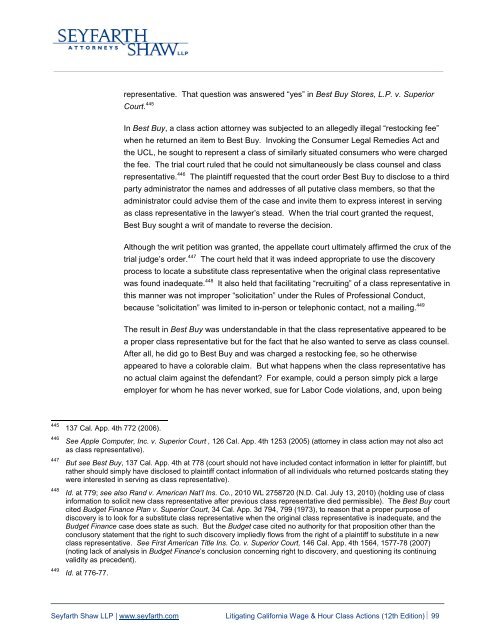Litigating California Wage & Hour and Labor Code Class Actions
Litigating California Wage & Hour and Labor Code Class Actions
Litigating California Wage & Hour and Labor Code Class Actions
You also want an ePaper? Increase the reach of your titles
YUMPU automatically turns print PDFs into web optimized ePapers that Google loves.
epresentative. That question was answered “yes” in Best Buy Stores, L.P. v. Superior<br />
Court. 445<br />
In Best Buy, a class action attorney was subjected to an allegedly illegal “restocking fee”<br />
when he returned an item to Best Buy. Invoking the Consumer Legal Remedies Act <strong>and</strong><br />
the UCL, he sought to represent a class of similarly situated consumers who were charged<br />
the fee. The trial court ruled that he could not simultaneously be class counsel <strong>and</strong> class<br />
representative. 446 The plaintiff requested that the court order Best Buy to disclose to a third<br />
party administrator the names <strong>and</strong> addresses of all putative class members, so that the<br />
administrator could advise them of the case <strong>and</strong> invite them to express interest in serving<br />
as class representative in the lawyer’s stead. When the trial court granted the request,<br />
Best Buy sought a writ of m<strong>and</strong>ate to reverse the decision.<br />
Although the writ petition was granted, the appellate court ultimately affirmed the crux of the<br />
trial judge’s order. 447 The court held that it was indeed appropriate to use the discovery<br />
process to locate a substitute class representative when the original class representative<br />
was found inadequate. 448 It also held that facilitating “recruiting” of a class representative in<br />
this manner was not improper “solicitation” under the Rules of Professional Conduct,<br />
because “solicitation” was limited to in-person or telephonic contact, not a mailing. 449<br />
The result in Best Buy was underst<strong>and</strong>able in that the class representative appeared to be<br />
a proper class representative but for the fact that he also wanted to serve as class counsel.<br />
After all, he did go to Best Buy <strong>and</strong> was charged a restocking fee, so he otherwise<br />
appeared to have a colorable claim. But what happens when the class representative has<br />
no actual claim against the defendant? For example, could a person simply pick a large<br />
employer for whom he has never worked, sue for <strong>Labor</strong> <strong>Code</strong> violations, <strong>and</strong>, upon being<br />
445<br />
446<br />
447<br />
448<br />
449<br />
137 Cal. App. 4th 772 (2006).<br />
See Apple Computer, Inc. v. Superior Court , 126 Cal. App. 4th 1253 (2005) (attorney in class action may not also act<br />
as class representative).<br />
But see Best Buy, 137 Cal. App. 4th at 778 (court should not have included contact information in letter for plaintiff, but<br />
rather should simply have disclosed to plaintiff contact information of all individuals who returned postcards stating they<br />
were interested in serving as class representative).<br />
Id. at 779; see also R<strong>and</strong> v. American Nat’l Ins. Co., 2010 WL 2758720 (N.D. Cal. July 13, 2010) (holding use of class<br />
information to solicit new class representative after previous class representative died permissible). The Best Buy court<br />
cited Budget Finance Plan v. Superior Court, 34 Cal. App. 3d 794, 799 (1973), to reason that a proper purpose of<br />
discovery is to look for a substitute class representative when the original class representative is inadequate, <strong>and</strong> the<br />
Budget Finance case does state as such. But the Budget case cited no authority for that proposition other than the<br />
conclusory statement that the right to such discovery impliedly flows from the right of a plaintiff to substitute in a new<br />
class representative. See First American Title Ins. Co. v. Superior Court, 146 Cal. App. 4th 1564, 1577-78 (2007)<br />
(noting lack of analysis in Budget Finance’s conclusion concerning right to discovery, <strong>and</strong> questioning its continuing<br />
validity as precedent).<br />
Id. at 776-77.<br />
Seyfarth Shaw LLP | www.seyfarth.com <strong>Litigating</strong> <strong>California</strong> <strong>Wage</strong> & <strong>Hour</strong> <strong>Class</strong> <strong>Actions</strong> (12th Edition) 99
















